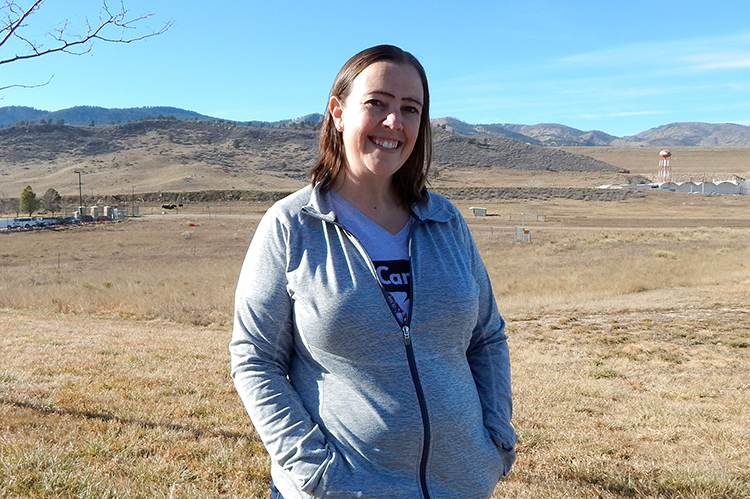Alumni Spotlight: Becky Bolinger

Becky Bolinger is an alumna of the Florida State University Department of Earth, Ocean and Atmospheric Science, part of the College of Arts and Sciences. Bolinger, who graduated with a master’s degree in meteorology in 2007, earned a bachelor’s in meteorology at the Metropolitan State University of Denver and completed her doctoral degree in atmospheric science at Colorado State University. While at FSU, she conducted research at the Center for Ocean-Atmospheric Prediction Studies and was a member of Chi Epsilon Pi, the meteorology honor society. She has worked for state climate offices since her time at FSU, and her career has taken her full circle as she presently serves as the assistant state climatologist at CSU.
Where are you from? What brought you to FSU?
I’m originally from Denver, Colo. One of the main factors that drew me to FSU was that my grandparents had lived in Tallahassee throughout my entire life. I’d been there before, and I knew I’d still be close to family, which was important to me.
What inspired you to choose your major and specific area of research?
I have always been fascinated by the weather, which got me into meteorology. As I was going through my undergraduate classes and noticed all of my classmates were focused on forecasting, I found myself gravitating more toward looking at the past climate, averages, records and trends. That’s when I realized I wanted to study climatology.
What aspect of your area of study do you find most fascinating?
I love how unpredictable climate variability can be. We basically know what to expect each season, but extremes and anomalies are part of what makes up climate, and I always find those so exciting.
You currently work as an assistant state climatologist and research scientist at Colorado State University. What is that experience like? What is your current research?
I really love my job because there’s so much to do, and no day is the same. I monitor the climate of Colorado, and it’s my job to ensure climate data and information are delivered to those who need it. I get to engage with the public and with a wide variety of different people, including water resource managers, ranchers, high school science teachers, and journalists. It’s fun to share my passion about Colorado’s climate with everyone around me!
How has your time at FSU prepared you for academic and professional success?
Going through the master’s program at FSU was incredibly challenging and rewarding. I have made some lifelong connections with others, and that is more valuable to me than anything. Being at FSU was also my first opportunity to work at a state climate office, the Florida Climate Center, and learn about climate services. That really launched me forward into all the climate services work I’ve done ever since. All of the classwork and research I did there really prepared me in terms of learning to program, analyze data and present results.
You served as a postdoctoral fellow at the National Oceanic and Atmospheric Administration Great Lakes Environmental Research Laboratory and have been active in the American Association of State Climatologists. What have these experiences been like?
My postdoctoral appointment was a unique opportunity that allowed me to combine climate research with applied climate to help in decision-making. Not only did I participate in research at NOAA GLERL, but I got to take that information and help guide decisions for the U.S. Army Corps of Engineers and energy providers on the Great Lakes. I hope that anyone who is passionate about climate has the opportunity to partner with decision-making institutions and learn how climate information actually gets used.
My involvement with the American Association of State Climatologists started during my FSU days, as my adviser, the late professor emeritus of meteorology and oceanography Jim O’Brien, was the state climatologist at the time. It is a small, but wonderful community, filled with amazing scientists who are passionate about climate services. We don’t just study the climate; we want to get that information out there and be a part of solutions as we learn more about our changing climate and its impacts on society.
Who are the faculty or staff members who helped or inspired you during your time at FSU?
I would not be where I am today without Jim O’Brien taking me on as a student. As far as coursework during my time there, I found professor of meteorology Robert Hart’s classes to be the most challenging, but those challenges really pushed me to a higher level. I also received inspiration from associate professor of meteorology and Geophysical Fluid Dynamics Institute researcher Ming Cai, who took the time to discuss my thesis in detail and encouraged me to pursue a Ph.D.
What are your favorite experiences from your time at FSU?
I was primarily located off the main campus because COAPS and its research groups were located at Innovation Park. Those of us who worked out there developed very close bonds. To this day, I still have close friends from my time there. I will never forget the parties we had, the adventures we went on, or the homework and tests we agonized over together.
What do you like to do when you’re not doing academic work or research?
I have a husband and a 5-year-old daughter, so the majority of our “free” time is spent chasing her around. Colorado is great for outdoor activities, so I do a lot of running, cycling and hiking, when I can. We usually take a couple of trips to the mountains every year as well. I also love dancing, and I regularly take a clogging class.
What advice do you have for students?
Don’t ever forget that you deserve to be where you are. If you feel like you’re not good enough, or you’re not doing enough, those are normal feelings that most everyone around you has as well. But don’t listen to that voice. You can do this!
